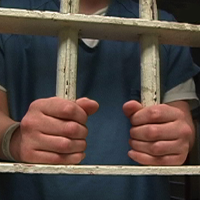Judge Orders Release of First Inmate under New Three-Strikes Law

The nonpartisan Legislative Analyst’s Office says the November 6 passage of Proposition 36, the three-strikes reduction initiative, could save the state prison system $70-$90 million annually. It also says its numbers could be way off, “depending on several factors,” like how fast the courts re-sentence qualifying inmates.
San Diego Superior Court Judge David Danielsen got the ball rolling on Wednesday when he took eight minutes of courtroom time to reduce serial burglar Kenneth Glenn Corley’s 25-years-to-life sentence to, essentially, time served. Corley, a lifelong drug addict, served 16 years after getting his third strike for possession of drugs for sale.
Prop. 36 made a major change in the original 1994 three-strikes law. It allows reduction of previously mandatory 25-to-life prison sentences for third-strikers who commit non-serious, non-violent felonies, and applied the change retroactively to those already in prison. Approximately 3,000 of the state’s 9,000 third-strikers, out of a total prison population of around 135,000, qualify for re-sentencing.
The state is under a court order to cap its prison population at 112,032 by June 2013, but has indicated it can’t make the deadline. The prison population began shrinking from a high of 173,312 in 2007 after the state prison system responded to pressure from the courts to do something about overpopulation and detestable medical care. In October 2011, the state launched a realignment plan that shifts responsibility for individuals convicted of specified nonviolent, non-serious, non-sex crimes from the state to counties.
Corley, who was incarcerated at Pleasant Valley State Prison in Coalinga, was represented by the San Diego County District Attorney’s Office and the Institute for Criminal Defense Advocacy at California Western School of Law in San Diego. The institute is also handling the case of Sergio Ayala, who earned his third strike in 1995 when he stole a leaf blower from a truck owned by his ex-wife. His case is expected to be in court next week.
Leandro Andrade may be close behind. The 37-year-old Army veteran and drug addict got the maximum three-strike sentence after he shoplifted nine videos worth $153 from two stores in 1995. Normally, petty theft is a misdemeanor and isn’t counted as a strike. But prosecutors chose to pursue it as “petty theft with a prior” and Andrade’s not-insubstantial rap sheet did him in. The judge sentenced him to consecutive terms of 25-to-life for the two thefts.
His case was appealed, but the state Court of Appeals ruled it didn’t violate the Eighth Amendment’s prohibition against cruel and unusual punishment. It eventually made it to the U.S.Supreme Court, where Justice Sandra Day O’Connor wrote the 5-4 majority decision in 2002 rejecting Andrade’s appeal. She found it was “not an unreasonable application of clearly established federal law.”
She may have a point. Writing about the case in 2003, Erwin Chemerinsky, founding dean of the University of California, Irvine School of Law, noted that 344 third-strikers with max sentences were there for shoplifting, i.e., petty theft with priors.
–Ken Broder
To Learn More:
First Inmate Released under Three-Strikes Law (by Greg Moran, U-T San Diego)
1st Inmate Released under New Calif. 3-Strikes Law (Associated Press)
Third-Striker Expected to Gain Release Wednesday (by Greg Moran, U-T San Diego)
Three Strikes Law. Sentencing for Repeat Felony Offenders. Initiative Statute. (Legislative Analyst’s Office)
California Western Attorneys Secure First Release of a Non-Violent Offender Under Prop 36 (California Western School of Law)
Popular Fix of Three-Strikes Law Wouldn’t Save State from Missing Prison Overcrowding Deadline (by Ken Broder, AllGov California)
- Top Stories
- Controversies
- Where is the Money Going?
- California and the Nation
- Appointments and Resignations
- Unusual News
- Latest News
- California Forbids U.S. Immigration Agents from Pretending to be Police
- California Lawmakers Urged to Strip “Self-Dealing” Tax Board of Its Duties
- Big Oil’s Grip on California
- Santa Cruz Police See Homeland Security Betrayal in Use of Gang Roundup as Cover for Immigration Raid
- Oil Companies Face Deadline to Stop Polluting California Groundwater





